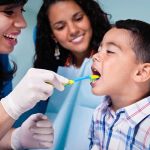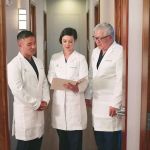When to Call Your Dentist During a Dental Emergency
Dental emergencies can happen unexpectedly, and knowing when to call your dentist is crucial to getting the right treatment quickly. I’ve been in situations where I’ve had to make a decision on whether or not to contact my dentist right away, and let me tell you, it can be a bit stressful. However, in many cases, addressing dental problems promptly can prevent long-term damage, reduce pain, and speed up recovery. So, if you’re wondering when to call your dentist during a dental emergency, here’s a guide based on my own experience and what I’ve learned from professionals.
1. Severe Toothache: A Sign of Something Serious
One of the most common dental emergencies is a toothache. While mild discomfort can often be managed with over-the-counter pain relief, severe toothaches may indicate an underlying issue such as an abscess, infected tooth, or even a cracked tooth. A few months ago, I experienced a sharp pain in my molar that wouldn’t go away, even after trying to relieve it with cold compresses and painkillers. I hesitated for a bit, but after a sleepless night of throbbing pain, I called my dentist right away. The problem turned out to be an abscess, and had I waited any longer, it could have spread to other parts of my mouth, requiring more complex treatments.
2. Knocked-out Tooth: Time is Critical
If you or someone you know has knocked out a tooth, time is of the essence. The quicker you act, the better your chances are of saving the tooth. I once had a friend who lost a tooth during a basketball game, and he immediately placed the tooth in a cup of milk to keep it moist. We rushed to the dentist, and luckily, they were able to reattach it. In these cases, you should call your dentist immediately and keep the tooth in a safe, moist environment (like milk or saline) until you can get to the office.
3. Broken or Chipped Tooth: Don’t Wait to Fix It
Whether you’ve cracked your tooth while eating or due to an accident, broken or chipped teeth are not just a cosmetic issue. They can cause pain and expose the sensitive nerves inside the tooth. A few years ago, I chipped my front tooth on a hard candy, and while it wasn’t extremely painful, it left me feeling self-conscious. I called my dentist, who was able to repair the tooth with a dental filling quickly. Depending on the extent of the damage, your dentist might recommend a filling, crown, or even a root canal.
4. Swelling or Abscess in Your Gums
Swelling in your gums could be a sign of a serious infection. If you notice pain, redness, or a pimple-like bump on your gums, it could indicate an abscess or infection that requires immediate treatment. Last year, I noticed a bump on my gums that seemed to grow over time. It became painful, and I knew I needed to see my dentist as soon as possible. After a thorough examination, the dentist identified an infection that was being caused by a cavity deep inside my tooth. I received treatment right away, which helped me avoid further complications. Don’t wait to call your dentist if you see swelling in your mouth—an untreated infection can lead to more serious health problems.
5. Loose or Lost Filling: A Small Issue That Can Get Bigger
If you lose a dental filling or if it becomes loose, it might not seem like an emergency, but it can become one if not treated. I once lost a filling while eating something hard, and though there was no immediate pain, I knew it could lead to tooth decay if I didn’t address it soon. I called my dentist immediately, and they were able to fix it quickly. A missing or loose filling can leave your tooth vulnerable to bacteria and decay, so it’s always best to reach out to your dentist as soon as you notice the issue.
6. Bleeding Gums: Don’t Ignore the Signs
Bleeding gums can sometimes be a sign of gum disease or a more serious issue. If your gums bleed regularly while brushing or flossing, it’s a good idea to get checked by your dentist. A couple of months ago, I noticed my gums were bleeding more than usual after brushing. It wasn’t painful, but I didn’t ignore it. My dentist confirmed that it was an early sign of gum disease and provided treatment to help me avoid more severe issues down the road. It’s important to call your dentist if your gums bleed frequently, as early intervention can prevent more complicated treatments later on.
7. Tooth Sensitivity: It Could Be a Bigger Problem
Tooth sensitivity to hot, cold, or sweet foods and drinks is another issue that can signal a deeper problem. I remember when I started noticing heightened sensitivity in one of my teeth. Initially, I didn’t think much of it, but after a few days, it became more noticeable. I called my dentist, and it turned out that I had a small cavity that was starting to affect the tooth’s nerves. Sensitivity could also indicate worn-out enamel, cracked teeth, or gum recession. So, if your teeth become sensitive for more than a day or two, don’t hesitate to call your dentist for an evaluation.
8. Jaw Pain or Locking: It Might Be Temporomandibular Disorder (TMD)
Jaw pain or a jaw that locks could indicate a condition called temporomandibular disorder (TMD), which affects the joint connecting the jaw to the skull. I experienced this once after grinding my teeth at night, and my jaw became sore and occasionally locked in place. When I called my dentist, they were able to guide me through treatment options such as wearing a mouthguard at night. If you experience persistent jaw pain or have trouble opening and closing your mouth, it’s time to call your dentist to explore treatment options.
9. What to Do if You Don’t Have a Regular Dentist
If you’re in an emergency situation and don’t have a regular dentist, don’t panic. Many dental practices offer emergency services or will direct you to a nearby emergency dentist. If you’re unsure of where to call, you can often get referrals from local hospitals or urgent care centers. Most importantly, don’t ignore the situation—prompt care is critical in dental emergencies.
10. Preventative Care: Avoiding Emergencies in the First Place
While dental emergencies are sometimes unavoidable, there are steps you can take to reduce the likelihood of them happening. Regular dental check-ups are the best way to spot potential problems before they become emergencies. I’ve made it a point to see my dentist every six months, and this has helped me catch cavities, gum disease, and other issues early on. Eating a balanced diet, avoiding excessive sugar, and wearing mouthguards during contact sports are also important for maintaining good oral health.







 D3 Dental of Horsham4.0 (342 review)
D3 Dental of Horsham4.0 (342 review) Don C. Kalant Sr. DDS, FACD, FICD3.0 (32 review)
Don C. Kalant Sr. DDS, FACD, FICD3.0 (32 review) All Family Dental and Braces4.0 (689 review)
All Family Dental and Braces4.0 (689 review) Oral Surgery Hawaii4.0 (385 review)
Oral Surgery Hawaii4.0 (385 review) Spencer Dental & Braces4.0 (459 review)
Spencer Dental & Braces4.0 (459 review) Midwest Dental - Eagan4.0 (150 review)
Midwest Dental - Eagan4.0 (150 review) The Importance of Oral Health Education During Pregnancy for a Healthy Pregnancy
The Importance of Oral Health Education During Pregnancy for a Healthy Pregnancy Best Tips for Brushing Your Teeth Properly for Healthy Gums: Essential Techniques for Oral Health
Best Tips for Brushing Your Teeth Properly for Healthy Gums: Essential Techniques for Oral Health Why Skipping Dental Checkups Can Lead to Bigger Oral Health Problems
Why Skipping Dental Checkups Can Lead to Bigger Oral Health Problems Advantages of Porcelain Dental Restorations
Advantages of Porcelain Dental Restorations How Can Diabetes Cause Tooth and Gum Problems? Preventing and Managing Oral Health Issues
How Can Diabetes Cause Tooth and Gum Problems? Preventing and Managing Oral Health Issues Healthy Habits for Promoting Good Oral Health and Hygiene: Tips for a Healthy Smile
Healthy Habits for Promoting Good Oral Health and Hygiene: Tips for a Healthy Smile